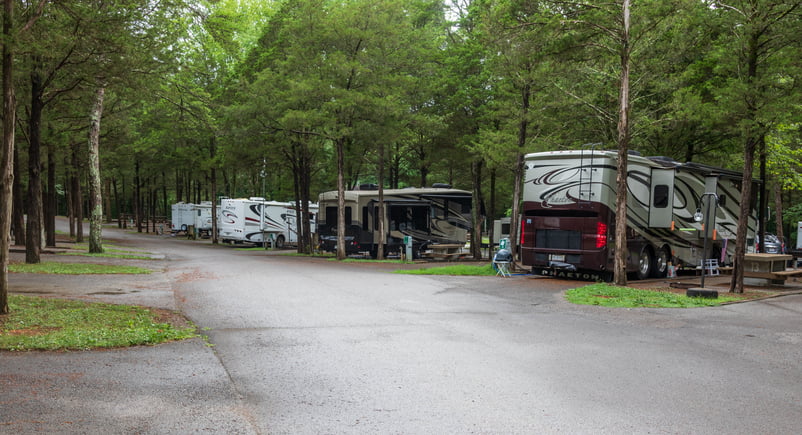Many options and choices are available to everyone who wants to engage in the RV lifestyle.
It’s important to remember that owning an RV isn’t a prerequisite to being an RVer. However, if you’re considering buying an RV and want to know the operating costs of ownership, here’s a three-step approach to help you get a clearer picture. Beginning with the end in mind, let’s:
-
-
- Identify the type of RV that will best support your RV lifestyle
- Talk about the fixed and operating costs of owning that RV
- Tie it all together to enable you to make the best-informed decision about your choice of RV lifestyle.
-
Step 1: What do you want from your RV lifestyle?
RVing isn’t just the RV unit itself. Just as architects talk about form following function, what you want from living the RV life will determine the type of RV you choose. Once you’ve identified the type of RV that meets your needs, you can then begin to meaningfully identify what your operating costs will be.
Here are some guiding questions to help you decide what type of RV to buy:
-
-
- How long do I plan to RV? Do I want to RV just on the weekends for a few years, or do I want to RV full time?
- Will I be travelling consistently, or will I stay in one place?
- What kind of camping do I want to do? Do I want to do primitive off-grid camping, or do I want to glamp in full-amenity RV parks?
- How will I spend my time in the RV? Do I see myself spending most of my time outside, or do I see myself spending a lot of time inside the RV?
- How many people will be using the RV at the same time? Will there be children, pets, or people who require accessibility assistance?
- What are features that I consider “must-haves”? Bunk beds? Storage for mountain bikes, kayaks, or ATVs? The ability to tow a vehicle? Something that’s easy to back up? Number of bathrooms? A dishwasher? A washer & dryer? A desk for remote working or crafts? A pantry?
- What are my cooking preferences? Will I want to cook inside the RV regularly?
- Who’s going to drive the RV? If I plan to share the driving responsibilities, how comfortable are we driving a vehicle bigger than a car? Will we need to upgrade our class of drivers license to drive this RV?
- If I choose a travel trailer or a fifth wheel, do I also need to buy a truck that’s large enough to pull it?
- What other personal financial goals and obligations do I have that must be taken into consideration when making my decisions about purchasing an RV? How do I feel about taking on debt to purchase an RV?
- How do I feel about buying a new RV compared to a used RV?
- What are the immediate costs associated with purchasing an RV? Typical costs include registering and licensing the RV; purchasing an extended warranty; completing upgrades/repairs; paying for the RV to be relocated; and “nesting” the RV with bedding, kitchen equipment, and other amenities to make the RV your home on wheels.
-
Step 2: Ongoing costs to support your RV lifestyle
Once you’ve identified which kind of RV will best support your desired lifestyle (a Class A, B, or C motorhome; a travel or destination trailer; or a 5th wheel), we can then talk more meaningfully about the costs of maintaining your desired lifestyle.
Fixed cost Items
Even before you begin to plan for your RV adventures, there are fixed cost items you’ll need to cover:
-
-
- Insurance for your RV (and for your towing vehicle or your “toad”)
- Site fees and/or off-season storage costs
- Winterizing and de-winterizing expenses
- Regular RV maintenance (including planning for tire replacement)
-
Travel Expenses
Keep these costs in mind when making your plans to head out on the road:
-
-
- Cost of fuel (diesel is currently more expensive than gasoline)
- Cost of propane
- Campground fees
- Laundry expenses (if you don’t have a washer/dryer on board)
- Road toll and ferry fees (tolls for RV’s are higher than for personal vehicles)
- Out of province travel insurance
- Pet-related expenses, including paying for pet insurance
- Emergency roadside assistance plan
- Memberships such as Terego, Explorer RV Club, Passport America, Boondockers Welcome, or Harvest Hosts
- Groceries and dining out
- Entertainment and other special activities you want to engage in while on the road
- Phone and internet service
-
Step 3: Tying it all together
Here are a few other suggestions to help you make the best-informed decision about what and how you want to engage in your RV lifestyle:
-
-
- Ask questions! Reach out to other RVers for their suggestions and insights. Research the RV communities and blogs including the Explorer RV Club. Check out YouTube videos.
- Rent an RV to test-drive the lifestyle
- Go to RV shows and seminars, check out the RV dealers in your community
-
After completing your research, you may find that owning an RV and paying the operating costs doesn’t fit with your other personal financial goals and obligations. Remember: Owning an RV is not essential for enjoying the RV lifestyle! There are many options available for renting an RV, allowing you to enjoy the RV life without the ongoing operating costs.
It’s a fact of life that owning an RV comes with ongoing operating costs. It’s important for each of us to know what these expenses are and then, taking our unique situations into consideration, make informed decisions about the best ways to enjoy RVing – with or without owning an RV!



